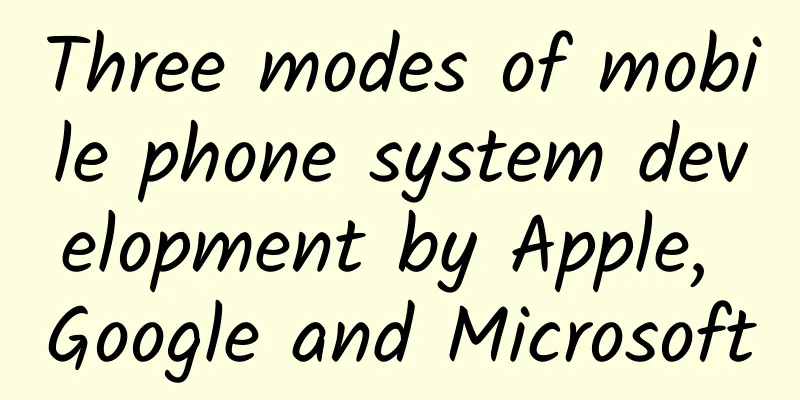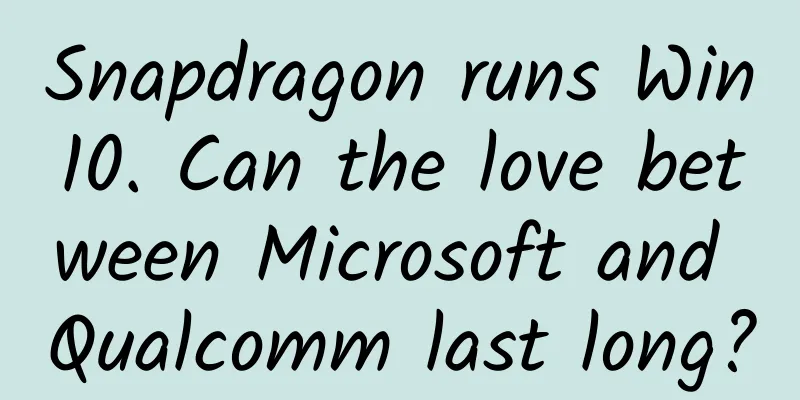Three modes of mobile phone system development by Apple, Google and Microsoft

|
Since people entered the mobile Internet era to the present, iOS and Android, led by Apple and Google respectively, have gradually dominated the entire world at the mobile operating system level. At the same time, Microsoft, the traditional desktop operating system leader, is not to be outdone. From resolutely abandoning the old Windows Mobile, to cooperating with the gradually weakening Nokia to launch Windows Phone, to the current Windows 10 unified platform strategy across desktops, tablets, mobile phones and other screen sizes, Microsoft has been trying its best to catch up, intending to occupy a place in the already mature mobile operating system landscape. Although the current Windows Phone market share is less than 3%, it is backed by Microsoft, a wealthy giant, and coupled with the joint effect of unified platform communication with the Windows 10 desktop version, the future Windows 10 mobile version still has room for growth. This is the current situation of the entire mobile operating system dominated by the three technology giants. However, if we compare the operating modes of the three giants in the mobile operating system, we will find some interesting things. If we compare a mobile phone to a person, then the hardware can be said to be the body of the phone, and the software can be said to be the soul of the phone. iOS is the soul of the iPhone. "Everyone who loves software should make their own hardware." This famous quote that brainwashed Steve Jobs fully and powerfully explains the product concept of the iPhone equipped with iOS in the eight-year development process. Apple has firmly controlled the iPhone in its own hands, whether it is software or hardware. Therefore, we cannot talk about iOS in isolation, it will always exist as a part of the iPhone. The iOS system itself is developed by Apple and is exclusively used by Apple's own products. However, the attraction of iOS is not only in Apple's development on the iOS system, but more importantly, in the rich and high-quality application ecosystem it has built. It is precisely because countless developers choose to develop their own applications on the iOS platform that this application ecosystem has been built. Therefore, in a sense, iOS belongs to Apple and developers, but ultimately to Apple. Why? Because Apple only allows developers to participate in the development of applications, but still firmly controls every aspect of software review, release, download, etc. To make a vivid analogy, Apple is like drawing a circle, which is made up of countless points. The center of the circle is Apple, and the other points are like developers. All these points make up iOS, but Apple is always the core of the circle, and the other points revolve around the center. Moreover, the entire circle is drawn by Apple and is completely under Apple's control. Why can Apple, the center of the circle, generate such a strong centripetal force that developers revolve around Apple? It is because Apple has left two openings in this circle, one entrance and one exit; the entrance is for developers, and the exit is for consumers. On the one hand, Apple attracts consumers to pay for high-quality iOS apps through the exit, and on the other hand, it attracts developers to enter through the entrance by taking up to 70% of the revenue from paid apps. Apple, which has firmly grasped the entrance and exit, can also make profits by extracting 30% of the paid APP revenue. Apple has built a complete communication platform for consumers and developers through iOS, and this platform belongs only to Apple. Moreover, we should not forget that iOS is only a part of the iPhone; when iOS is perfectly combined with Apple's equally excellent hardware design, it forms a mobile phone product with unique appearance, beautiful interface, powerful functions and rich applications. Perhaps in Apple's eyes, the most important thing is a brand new product, and iOS and other hardware as software are just important tools to realize this product. As for how to realize this product, as Jobs and Cook often said, "Only Apple could do that." This is probably the reason why Apple chooses to close both MAC OS and iOS. Compared with Apple, Microsoft is more like a company that focuses on operating systems and software; this is reflected in the past when the Windows operating system dominated the global computer era, and also in the current mobile Internet era. After giving up Windows Mobile and switching to Windows Phone, Microsoft chose to cooperate with Nokia, which was in urgent need of transformation to face the new situation. As a result, we saw the emergence of many Nokia Lumia phones equipped with Windows Phone operating system, and the survey report on Windows Phone released by AdDuplex in October 2013 showed that the Nokia Lumia series accounted for 89.2% of the entire Windows Phone market share. It can be said that Nokia has almost become synonymous with WP. However, it should be pointed out that Nokia was not the only WP phone brand. In fact, in addition to Nokia, other famous mobile phone brands such as Samsung, HTC, and Huawei also launched phones equipped with WP systems at that time; although their sales in the WP camp were not as outstanding as Nokia, and these manufacturers later gave up launching new models under the WP brand, it cannot be denied that they once cooperated with Microsoft. Therefore, from here we can see that Microsoft still chooses to make a good operating system in the mobile Internet era, and then license it to other mobile phone manufacturers, which is exactly the same as its approach in the direction of desktop operating systems. In fact, in the past, Microsoft's ambition has always been to allow all computers in the world to use its Windows desktop operating system, and it has basically done it; and now, its ambition has become to allow all mobile phones to be equipped with the Windows Phone operating system. Of course, this is basically impossible this time, but this is Microsoft's thinking. Its focus is still on the operating system, and it does not interfere too much with the manufacture of hardware; this means that it takes a long time for Microsoft to launch each version of the operating system because it has to consider the compatibility issues with hardware from different manufacturers. This did not pose a threat to Microsoft in the PC era, but in the era of mobile operating systems where updates and iterations are so rapid, it is a big flaw. Although Microsoft has acquired Nokia's smartphone business and launched its own Lumia series of phones, under the full-platform strategy of Microsoft's next-generation operating system Windows 10, Microsoft has signed agreements with Lenovo, HTC and many other companies to promote the development of Win10 phones. It can be seen that compared to its own Lumia phones, Microsoft pays more attention to the development of Windows 10, and it will never monopolize its own operating system like Apple does. If you buy 10 mobile phones equipped with Apple's iOS system, you have no choice in hardware and software, they can only be iPhones; if it is Microsoft's WP system, you can choose the hardware, but the software interfaces are all similar; and if it is Google's Android, congratulations, you have entered an extremely rich and even somewhat complicated world of Android phones. Compared with Apple and Microsoft, both of which are 40-year-old companies, Google is younger. This technology giant, which started as a search engine and gradually penetrated into many fields, seems to understand the spirit of freedom, equality and openness of the Internet better. When Google decided to use Android to make a difference in the mobile Internet field, no one would have thought that it would choose to form an open mobile alliance with 84 members. So we saw that when the iPhone came out, many mobile phone manufacturers flocked to embrace Android in various ways and formed a huge camp, thus pushing Android to the top of the mobile operating system. But for Google, Android both belongs to it and does not belong to it. Google provides the underlying source code of Android, establishes the basic architecture and application specifications of Android, and every year Google upgrades the functions, operations and interface of native Android. It can be said that there would be no Android without Google. However, it is precisely because of this openness that the entire Android camp presents a colorful and fragmented situation; countless Android phone manufacturers have transformed Android in various ways in their own way, and the entire Android application ecosystem is in chaos, and the quality of applications varies; and for various reasons, different versions of Android systems are distributed on different models of mobile phones. The entire Android ecosystem, whether in hardware or software, is not controlled by Google at all. Of course, we cannot say that Google has not tried to regulate and control. Google has also tried to unify the Android application ecosystem through the Google Play application store, but each manufacturer has built its own application store. Google has also set an example for many Android manufacturers by launching the Nexus series of mobile phones, but it seems that no one buys it. Android's origin and growth process have determined that it can only be Google in name but not in reality. Perhaps Google had no intention to dominate the entire Android operating system, and even less to make money from selling phones like Apple did. It was more of a leader in the mobile Internet era, leading a wave of mobile Internet through the Android operating system, while delivering a new way and concept of connecting to and embracing the Internet to the whole world. It was more like a pure connector. Whether it is the corporate culture of the three major technology giants, their performance in financial statements, or their actual actions at present, we tend to believe that Apple is more focused on products, Microsoft is based on software, and Google is more like an Internet company; their business directions are obviously different, and this difference is also more obvious in the three's choice of operating mode for mobile operating systems. Relatively speaking, Apple's iOS is the most closed, while Microsoft's Windows Phone (the next version is called Windows 10 mobile) is relatively open when it comes to hardware docking, but it still pursues absolute control over software; and the two have one thing in common, they both continue the thinking of the past desktop operating system when making mobile operating systems. On the other hand, Google's Android is labeled with freedom everywhere. There is a question worth pondering here: Compared with the closedness of iOS, the openness of Android seems to be more in line with the concept of the Internet; however, we can also clearly see that compared with the Android camp, whether in software fragmentation or blind development of hardware, the development of Apple's iOS and iPhone seems more rational and balanced. Therefore, this involves a philosophical question: freedom and moderation. Freedom is allowed, but it must not be indulgent; moderate freedom is the real freedom. Of course, we can also extract some common points from the performance of the three technology giants in the mobile Internet era: that is, they all firmly believe in the power of technology, the power of the Internet, and are working hard to use technology and the Internet to change the world and make people's lives better. There is a book about Steve Jobs, titled "To Live is to Change the World". Perhaps this sentence is not only about Steve Jobs, but also a true portrayal of the three major technology giants. Therefore, we pay deep respect to the three giants and all their efforts to make the world a better place. |
<<: Why Israel will become the second Silicon Valley?
>>: Sony developers' welfare Android M image released
Recommend
A brief analysis of the successful cases of leveraging marketing on New Year’s Eve!
New Year's Day is the beginning of the new ye...
When her son ate his classmate’s birthday cake, his mother angrily claimed in the WeChat group that he was “poisoned”. Is it really true that you can’t eat a single bite of vegetable cream?
A piece of social news has sparked heated discuss...
Summary of common questions about placing Toutiao ads?
Toutiao ads are information flow ads, which are r...
How much does it cost to customize a logistics mini program in Changge?
How much does it cost to customize the Changge Lo...
Search advertising or social media advertising, which one is better?
When it comes to advertising, especially digital ...
Scalpers resell Tesla Model 3 reservations and earn 300% profit
According to a report by the financial website Ma...
A brief history of operations: everything you want to know and don’t want to know
I must be honest, this article is the most time-c...
When will the 2022 Beijing Winter Olympics and Paralympics Summary and Commendation Conference be held? Where exactly will it be held? Live streaming platform included!
The 2022 Beijing Winter Olympics and Paralympics h...
How much does it cost to attract investment for the Nanchong Rubber and Plastic Mini Program? What is the investment quotation of Nanchong Rubber and Plastic Mini Program?
Starting a business requires costs, and mini prog...
The best way to fight aging is not retinol, but...
Compiled by: Gong Zixin Retinol Can be called the...
How much does it cost to learn SEO in Shenzhen? Where can I learn SEO?
Many people have been saying that "SEO"...
A powerful anti-inflammatory ingredient is hidden in this "golden seasoning"
Curry is really delicious! Curry chicken, curry b...
Growth Hacking | User Growth Tips from Google!
The concept of growth hacking has always been ver...
5 basic elements of event operation!
The event details actually test the event planner...
The food we eat during the Spring Festival is too greasy. Can these foods "strip away the greasiness"? It's time to know the truth...
This article was reviewed by Li Lin, PhD in Food ...









